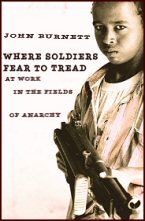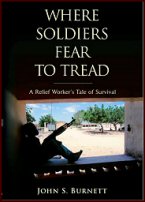|
Prologue
There
is going to be a shooting here and it is a toss-up who is going
to get the boy’s first round. The soldier, about ten years
old, is jamming the barrel of his gun hard against my driver’s
face and unless the kid decides to go for me, the relief worker,
my driver is going to get his head blown off.
There is something in the back of boy’s eyes. Not an expression
of anger or fear or hatred that might cause someone to want to kill
but the icy indifference of a child’s ignorance. He has a
gun. He pulls the trigger. So what? There is no dealing here.
In the few weeks serving as a relief worker in Somalia, a nation
rent by a decade of anarchy, I have come to fear children with guns.
It is one thing to face an adult with a full load. But children,
unlike grownups, do not have a personal history to balance, to offset
the matter-of-fact, to work out anything rational; few adults, no
matter how experienced know how to persuade a child not to shoot.
If killing is what he knows -- and ten years of war is a long time
to a ten-year-old carrying a gun -- then there is little chance
for reasoning, any one-on-one communication. Cock it. Shoot it.
Next.
* *
Somalia is in the throes of what is known in the jargon of humanitarian
work as a “complex emergency,” a rather oblique way
of acknowledging that we have been sent into a hostile, unstable
region. Unusually heavy monsoon rains spawned by El Niño
have triggered floods that have submerged most of the country’s
agricultural heartland; thousands have drowned, nearly a million
made homeless and starving. The United Nations, desperate and in
a hurry, recruited civilians off the streets with maritime experience
to drive riverboats. We were to deliver and distribute tons of medical
supplies, food, clothing and emergency shelter in a land still classified
as a war zone.
When we joined this relief mission, we were told it should be safe,
that we would be among a friendly people who welcomed our help,
that there were no troubles in Somalia anymore. Somalis, we were
informed, knew that we were sent on a mission of mercy, an attempt
to keep people alive, clothed and sheltered and that we represented
the goodwill of the developed world. Somali resentment was a thing
of the past, a conflict long ago between Western peacekeepers and
warlords. Yet we are discovering that in the eyes of Somalis, any
international assistance no matter how well intentioned, is still
foreign intervention -- whether the international community is represented
by a peacekeeper with a gun who rides herd on a relief convoy or
an unarmed aid worker delivering life-saving medicine through the
malarial and crocodile-infested floodwaters. We also were assured
that we would be pulled out if the bullets ever started to fly.
We took their word for it. Yet from what we have already seen, from
all the missed and unanswered communications to UN headquarters,
we wonder if they remember that they sent us out here in the first
place.
This past week, feuding warlords have kept our little compound under
siege and held us hostage, ambushed one of our food convoys and
taken potshots at us. We try to convince ourselves that they do
not want to kill us, that we are far more valuable to them alive
than dead. Not as distributors of Western largesse but as hostages
who would fetch enough ransom to keep a warlord in guns and bullets
for months. These terrifying games are played with calculation by
adults, men who know how vulnerable we are without the protection
of peacekeepers, who know what a bullet can do. Our fear, however,
is getting shot not by the bullet aimed at us but by the stray that
had been aimed at someone else.
Then there is the child with the loaded gun.
We get accustomed to seeing proud little boys strut through the
hot and dusty streets with their militia buddies toting assault
rifles and grenade launchers. Here in the port city of Kismayo,
there are plenty of kids and plenty of guns. Anarchy, it seems,
does not soften the Somalis’ ability to make children.
* *
Gritty and exhausted, I duck into the UN Land Rover for the trip
back to the compound after another futile day sorting out the pieces
of what is left of the bombed-out port facilities. As acting Port
Manager, an exalted reward for being the only one available with
any merchant marine experience, it is my job to prepare for the
arrival of chartered ships bringing emergency supplies that will
be delivered to the refugees Up Country. It is also my task to set
up a logistics base for the small riverboats from which to mount
these relief operations.
I slump between my militia guards in the back and stare out at the
harbor as our old muffler-less Land Rover, hired from some local
warlord -- no doubt booty from the last conflict -- chugs past rusting
shipping containers on the pier. The muzzles of the guards’
assault rifles stick out of the car windows like deadly quills of
a porcupine.
Harun, my cheerful young Somali driver who wears an old sweat-stained
New York Yankees baseball cap backwards, is very suave and he loves
to chew his leaves of Qat. His tough uneven face, charred with several
days’ growth, is belied by remarkably sympathetic eyes. His
youthful swagger seems unaffected, enviously natural. He could be
at home on any dark city street. He has the moves.
Harun hums along to a scratchy Arabic tune on the radio; his Kalashnikov
rests against the front seat, its barrel just visible above the
dashboard. His electric incense burner plugged into the cigarette
lighter emits a resinous smoke.
The harbor is little more than a large open bight carved out of
the coral reef. It is surrounded by white sand beaches littered
with the shells of burned out vehicles, rusting razor wire and garbage.
A causeway into the city leads from an abandoned packing plant,
the shell-cratered Port Office headquarters and the wharf. A helicopter
landing area once used by the escaping UN military forces is painted
as a faded white cross within a faded white circle on the pier.
The tide is out. On a nearby mud flat under an unstained blue sky,
broad-shouldered black and white Marabou Storks on stilted legs
rip apart something human-size -- heavy and meaty. In one smooth
easy motion, they strip the flesh with their long and powerful yellow
bills, swing their long necks skyward and with a couple of impatient
gulps, swallow whole the chunk of meat.
The armed militia manning the barricade at the port gate has a good
idea of my schedule. Rifles on their shoulders and bandoleers of
bullets strapped across their chests, they stoop to window level
to inspect those within the white vehicle with the stenciled blue
UN lettering on the hood; with Qat-stained grins, they return my
thumbs-up and shout “Diep Maleh!” – No
problem! And wave us through.
Beyond, on the other side of the gate, the children playing in front
of their rounded stick-built homes covered with animal hide also
know when to expect my rig. Despite the barrels of the guns poking
out the windows, these naked urchins, with grand smiles and excited
voices, chase alongside the vehicle through the puddles of water
and scattered rubbish waving and laughing hello to the lone white
figure inside. I lean across the guards and wave back. I am a sucker
for kids.
“You have children, Captain?” Harun asks over his shoulder.
“Yes, Harun.”
“In Somalia, you are rich man when you have a cow, a gun,
some wives, and many children.”
“You have children, Harun?”
“No, Captain. One wife. A cow. A gun. But one day -- children.”
The last barricade before entering town is formidable; razor wire,
steel girders, and a scattering of heavy artillery casings block
the laterite road. It is in a beautiful location, on the flat with
the Indian Ocean on one side and the bay on the other.
The roadblock appears unmanned. Strange. I am edgy today –
more so than usual. There was an artillery exchange near our quarters
– the sound of distant incoming, although not unusual, is
hardly conducive to a night’s rest. I suppose the clan that
currently owns the city and the other clan near the airport who
wants it back occasionally need to lob shells back and forth to
keep their boys alert and the machines working. Still anything out
of the usual fires the adrenaline and this unmanned roadblock is
unusual.
Harun honks impatiently. I sense my guards tighten.
There is some movement in the shadows of the portal of the cement
blockhouse. A little boy not more than ten years old emerges from
out of the darkness and marches toward the car cradling an AK-47;
one of the attractions of the rifle is that it’s so light,
even a child can carry one. He wears a full-length yellow smock,
torn at the shoulder; the rip exposes his brown baby skin. His clean
round face and his soft eyes display that precious naiveté
of youth – he looks like a nice kid.
With a charming attempt to snarl and with a manful squeak he orders
us out of the car. My guards and Harun look at each other and laugh.
A sudden black cloud of anger twists his little boy face; his small
soft eyes narrow with the petulance of a child who isn’t getting
his way. He is not going to be humiliated.
He steps up closer. He jabs his rifle into Harun’s face, the
barrel presses the flesh of his cheek. Harun secretly reaches for
the door handle. The boy realizes he is vulnerable and backs away.
His gun is leveled at the driver’s head. He has been trained.
The boy says something in Somali and Harun shuts off the car’s
engine. Sweat begins to form on my unshaven face.
|

